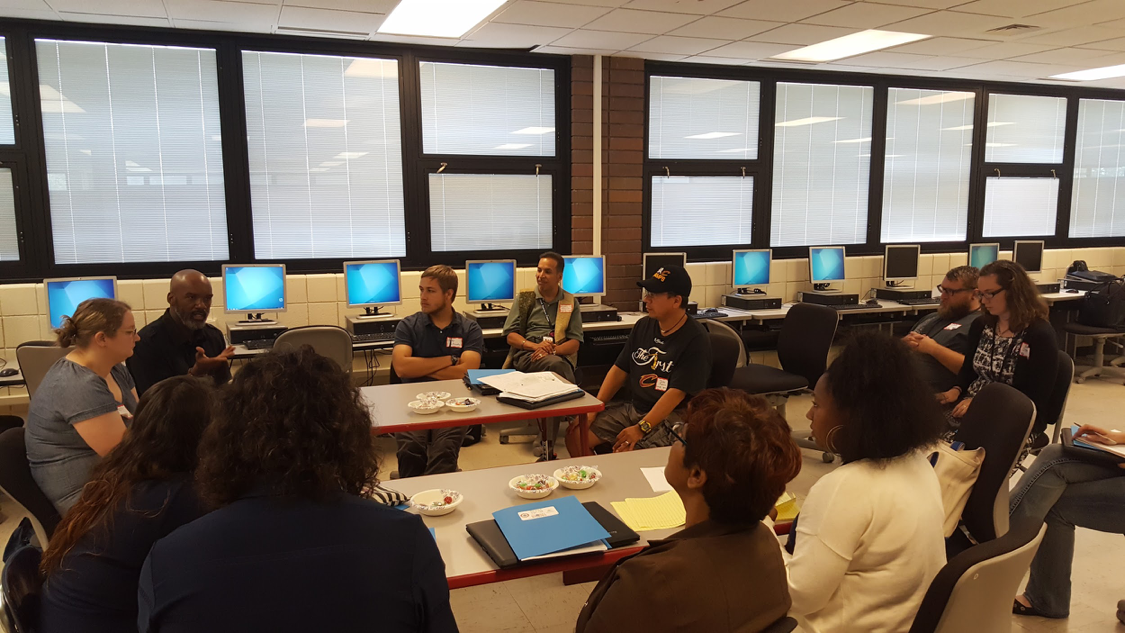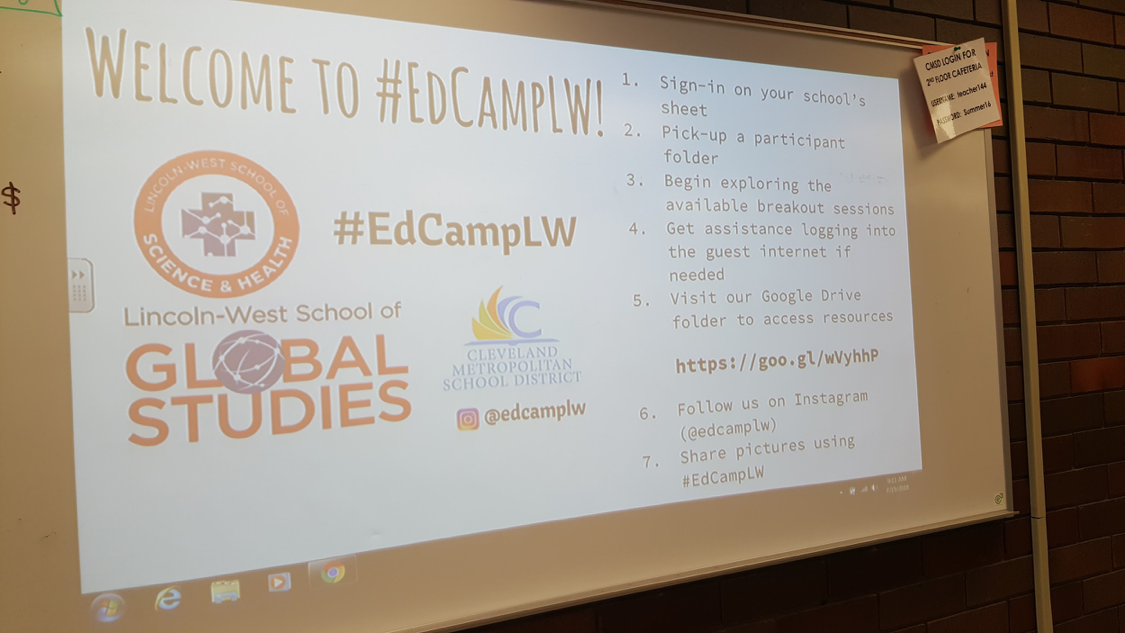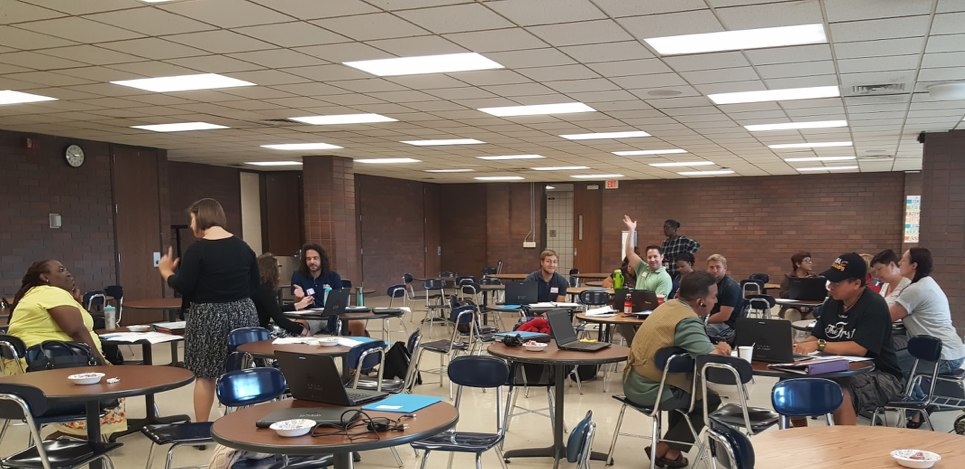
Teachers from two existing ObD schools in Cleveland, E3agle Academy and PACT Academy, shared their experiences with Lincoln-West teachers during a collaborative discussion session.
In Cleveland, we are working to design and open new, innovative schools that will meet the needs of our students, which differ from when many of us were in school ourselves. Through the process of designing these schools, we use 10 integrated school EdCamp-style PD with teachers at Lincoln-West School of Global Studies and Lincoln-West School of Science & Health, two new Opportunity by Design (ObD) schools that opened their doors to students for the first time in July 2016 through funding from Carnegie Corporation of New York and support from Springpoint.

Why the EdCamp Model?
I read a lot about EdCamp on education blogs, and was really intrigued about the model. If you haven’t heard of EdCamps before they are free, participant-driven PD, typically done in an “unconference” format. (Watch this video to learn more.) What excited me about this model was the chance to provide our teachers with PD that was personalized for and driven by them. I also saw this as an opportunity to bring together teachers from different schools, since our district has two existing ObD schools that opened in summer 2014. I knew that teachers from those two schools would provide valuable insights to our Lincoln-West teachers who are newer to the ObD work.
EdCamp was still new to me however, so I attended a local EdCamp in Cleveland to get a better sense of how it would help us provide effective personalized PD for our teachers. I saw a lot of things we could benefit from as a network of schools through the EdCamp model:
- All sessions for the day were created based on ideas submitted from participants. This allowed for relevant and personalized sessions.
- Participants came from a variety of schools, roles, and experiences. This led to rich, insightful and collaborative discussions. Participants were able to both share their knowledge as well as gain new ideas and understandings around topics that interested them.
- Throughout the day, ideas, resources, and strategies were shared in a Google Doc called the “Smack Down” for all participants to access during and after EdCamp.
- Participants were able to “vote with their feet”, meaning that if a session didn’t meet their needs, they could move to a different session whenever they wished.
After seeing an EdCamp in action, I felt that it would fit in well with the type of PD we wanted to provide for teachers.
Personalizing Our EdCamp Experience
After experiencing an EdCamp, I was excited to plan and an facilitate one for our teachers. However, there were still a few things we needed to personalize about the EdCamp model so that our teachers got what they needed.
- Submitting of session ideas: At a true EdCamp, session ideas are submitted the morning of the event. We wanted a little more time to make sure we had the right facilitators and resources we would need for the sessions, so we created a Google Form to have participants register in advance, and through this form they submitted their session ideas. They could submit ideas up until two days before the event.
- The creation of sessions: As we planned out the event, we grouped similar sessions ideas together. We then looked at all of these unique session ideas and decided to develop two types of sessions (check out our offered sessions here).
- Workshops: This is a different type of session than what is typically offered at EdCamps. We designed these 45-minute workshops to be interactive and productive. The facilitators would come with the resources needed to help the participants, but no pre-set presentation.
- Collaborative Discussions: A typical EdCamp session, Collaborative Discussions were designed as 25 minute sessions for idea sharing and conversations around various topics. Facilitators would help initiate the conversation, but where it went would naturally flow based on what the participants wanted to talk about; sometimes it would keep to the original topic, but a lot of times it could change into something entirely different.
- Facilitators: At EdCamp, there is not typically an identified facilitator for sessions but we wanted to make sure that there was a person in the room to provide support and insight specific to the session topic. Based on the submitted sessions ideas, we pulled together a team of facilitators that included myself, a consultant with Cleveland Metropolitan School District (CMSD), and teachers from our existing ObD schools to meet the needs of the participants.
Since we made some shifts to how we structured the event, we advertised it to teachers as an “EdCamp Style” PD rather than an official EdCamp.

Teachers are working together in team during the “Planning with Competencies” workshop with the support of Gaylea Prichard-Silvers, consultant with CMSD.
How Did it Go?
We were very pleased with how our first EdCamp went with our ObD schools. Teachers were engaged, and the feedback was very positive. Teachers said that they liked the personalization, small groups, and being able to actively collaborate with other teachers.
We anticipated several submitted session ideas around the two design principles of Mastery of Rigorous Standards and Personalized Student Learning, as we knew teachers would be seeking support in these areas. The session “Planning with Competencies” was one such session and participants had a chance to work with CMSD consultant Gaylea Prichard-Silvers to get feedback and planning support. This session provided support on Mastery of Rigorous Standards, and we offered it twice throughout the event to maximize the number of teachers who could attend.
Additionally, sessions such as “Finding Curriculum Resources Online” and “Haiku for Instruction” gave teachers a chance to explore online resources and EdTech tools to provide Personalized Student Learning in their planning and courses. Also, we looked at the entire event as an opportunity to model how teachers could potentially structure their classroom (on a smaller scale) to facilitate personalized learning based on the real-time needs of their students. While there is still much work to do through future PDs, teachers left the EdCamp event with more knowledge and ideas about how Mastery of Rigorous Standards and Personalized Student Learning could look in their own courses.
Here are some tips to think about if you are considering implementing a EdCamp style PD:
- Don’t make it mandatory. This event will be most effective if the participants have opted-in to participate rather than being required to attend. We scheduled our EdCamp during an optional PD day, and we still had a great turn out.
- Consider the length of the event. Our EdCamp was a half day event, which kept the planning of the session schedule manageable, didn’t overload participants with too much information, and gave them some processing time.
- Feed your participants. While we did not seek out sponsors for the event, we did provide lunch for participants.
- Choose the right space. Be sure to find a location that has a space large enough to fit everyone for opening and closing of the day, as well as appropriate break out rooms for sessions.
- Assemble participant folders. Give participants a folder with as much information as you can at the opening session. Once they break out into sessions, they are on their own until the end of the event. These folders might include:
- An agenda for the day
- Session schedule with room locations
- Wifi password
- Web-links to any important folders or documents
We look forward to facilitating more EdCamp Style PDs with our growing network of schools throughout the school year. To see learn more about our #EdCampLW PD, you can access our Google Drive folder with resources from the day. You can also follow @EdCampCMSD on Instagram.
Kristen Kelly is a Mastery Learning Specialist with the Cleveland Metropolitan School District (CMSD). CMSD has designed and opened four Opportunity by Design (ObD) schools through grants from the Carnegie Corporation of New York and support from Springpoint. Kristen has been part of the team working to design these ObD schools, and train and support the teachers in these schools as they implement a Mastery-Based learning model. Kristen is working with a team to develop a personalized professional development plan to support teachers at the ObD schools in CMSD.